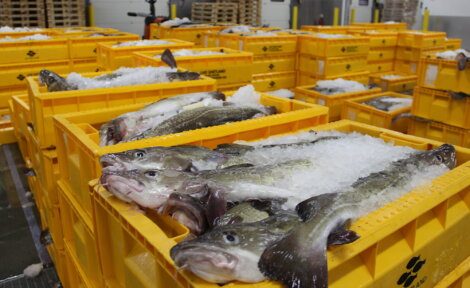Marine / Industry says new report on fish stock based on ‘naïve assessment’ and ‘limited understanding’
THE SCOTTISH fishing industry has dismissed a new environmental report on the state of the UK fish populations as a “naïve assessment based on only partial knowledge and limited understanding of fisheries science and management”.
In a 65-page report published today (Wednesday) international marine conservation group Oceana warns that half of the UK’s most important stocks are either overfished or in a critical state.
These include Northeast Atlantic mackerel, Northeast Atlantic blue whiting, North Sea anglerfish (monks), North Sea cod and Eastern English Channel king scallops.
To turn around the fate of fish stocks the report recommends that catch limits should not exceed scientific advice coming from the International Council for the Exploration of the Sea (ICES), while it supports the phasing out of non-selective and carbon intensive fishing methods.
Campaigners also want the UK to develop a clear and ambitious strategy to end overfishing, and to prove that “there is some power behind the rhetoric of being a fully independent coastal state for the first time in 40 years”.
Oceana director for the UK Hugo Tagholm said: “Our government claims to be striving for a ‘gold standard’ in fisheries management.
“Yet they continue to ignore the science and rubber-stamp the rampant exploitation of our seas. This not only puts fish populations at risk, but also everything that relies on them, including marine wildlife and the fishing industry itself.
“It is time for the UK to show political leadership and commit to catch limits in line with the science and a clear and ambitious strategy to end overfishing.”
Contrasting that assessment, the chief executive of the Scottish Fishermen’s Federation (SFF), Elspeth Macdonald, said that “we are fortunate in Scotland in having very well managed fisheries”.
Become a member of Shetland News
She continued: “Fisheries managers in the UK set quotas for mackerel based on ICES scientific advice, and the Scottish fleet fishes within these limits.
“Some other countries involved in the mackerel fishery do exceed limits, but we do not.
“Scientists now acknowledge that there is no such thing as a West of Scotland cod stock. We have a northern shelf cod stock that covers the North Sea and West of Scotland, and ICES advice due to be published very soon is expected to show that it is in good health.
“It will be evident that science is catching up with what fishermen have been saying for years – that cod are abundant in Scottish waters and that the stock is healthy.
“It’s also worth noting that the Scottish Government has a national indicator of the percentage of fish stocks fished sustainably.
“In 2020, an estimated 69 per cent of commercial fish stocks were fished at sustainable levels in Scottish waters. This represents an increase of 35 percentage points from 2000.
“The percentage fished sustainably in 2020 is the highest level recorded since this data collection began (1991) and demonstrates the ongoing recovery of the commercial fish stocks.
“No-one has a greater interest in fishing sustainably than those who make their living from the sea, and we strongly support greater cooperation and knowledge sharing between fishermen and fisheries scientists so we can have the best possible information on which to base the best possible management.”
Here is a link to UHI Shetland’s own assessment of North Sea fish stocks.
Become a member of Shetland News
Shetland News is asking its many readers to consider paying for membership to get additional features and services: -
- Remove non-local ads;
- Bookmark posts to read later;
- Exclusive curated weekly newsletter;
- Hide membership messages;
- Comments open for discussion.
If you appreciate what we do and feel strongly about impartial local journalism, then please become a member of Shetland News by either making a single payment, or setting up a monthly, quarterly or yearly subscription.



































































